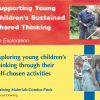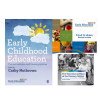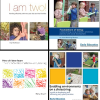How the Reception Year can be more inclusive for children with SEND
by Katherine Gulliver Introduction Early Education was recently asked to review the special educational needs and/or disabilities (SEND) provision in the early years within one
We deplore the recent article by The Telegraph which singled out Liz Pemberton for criticism of her anti-racism training, which she has delivered for many clients including local authorities.
The Statutory Framework for the Early Years Foundation Stage (as recently revised by the current Conservative government) states that: “The EYFS seeks to provide: …equality of opportunity and anti-discriminatory practice, ensuring that every child is included and supported.” It also states that, “Providers must follow their legal responsibilities under the Equality Act 2010 including the fair and equal treatment of practitioners regardless of age, disability, gender reassignment, marriage and civil partnership, pregnancy and maternity, race, religion or belief, sex and sexual orientation.”
It is entirely right that training should be provided to practitioners on this aspect of the Statutory Framework, as on all their responsibilities.
The types of training listed by the article, are also in line with the non-statutory Development Matters guidance published by the DfE which says that practitioners should:
We affirm our support for the vital work that Liz and other practitioners do to promote awareness and understanding of anti-racism and discrimination, including her contribution to the recent Birth to 5 Matters guidance. This must not be shut down by ad hominem attacks, but should be part of an ongoing public debate about the lived experience of racism in our society and how it can be addressed.
by Katherine Gulliver Introduction Early Education was recently asked to review the special educational needs and/or disabilities (SEND) provision in the early years within one
by Clarissa Frigerio Why are there so few men teaching in the early years? I have worked in the profession for almost 9 years, and
This article by Early Education Associate Anni McTavish explores the term “cultural capital”, and what it might mean for early years practitioners and their settings.
Introduction Race and racism in society is as important as ever; I am writing not only as a British South Asian who has experienced racism,






Early Education
2 Victoria Square
St Albans
AL1 3TF
T: 01727 884925
E: office@early-education.org.uk